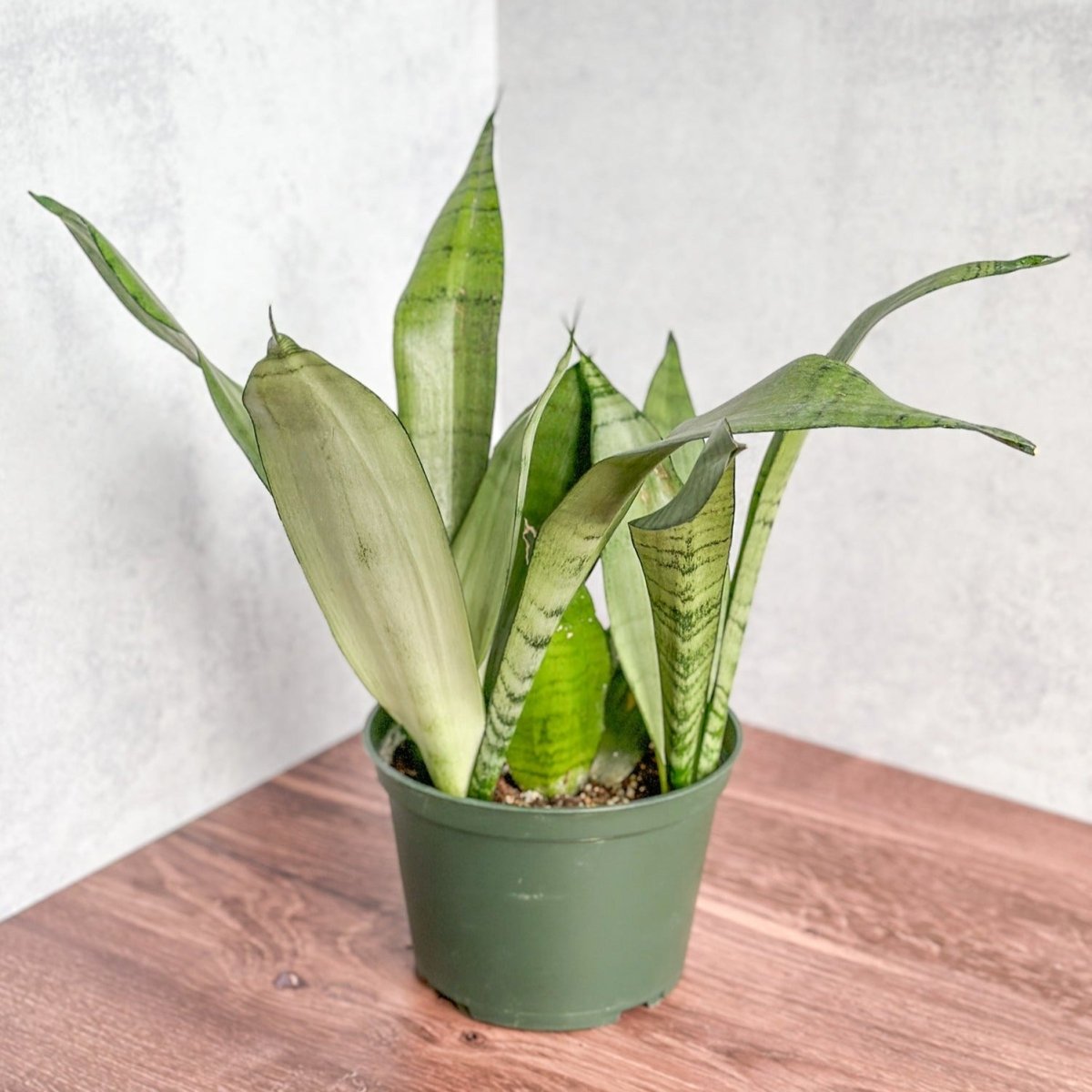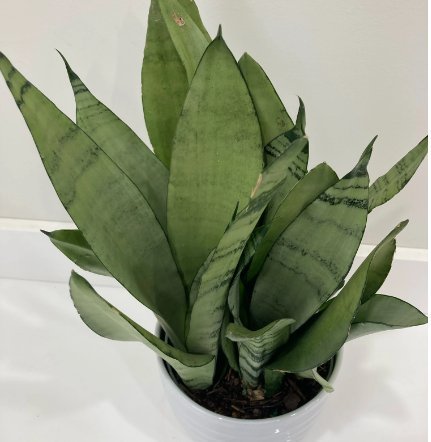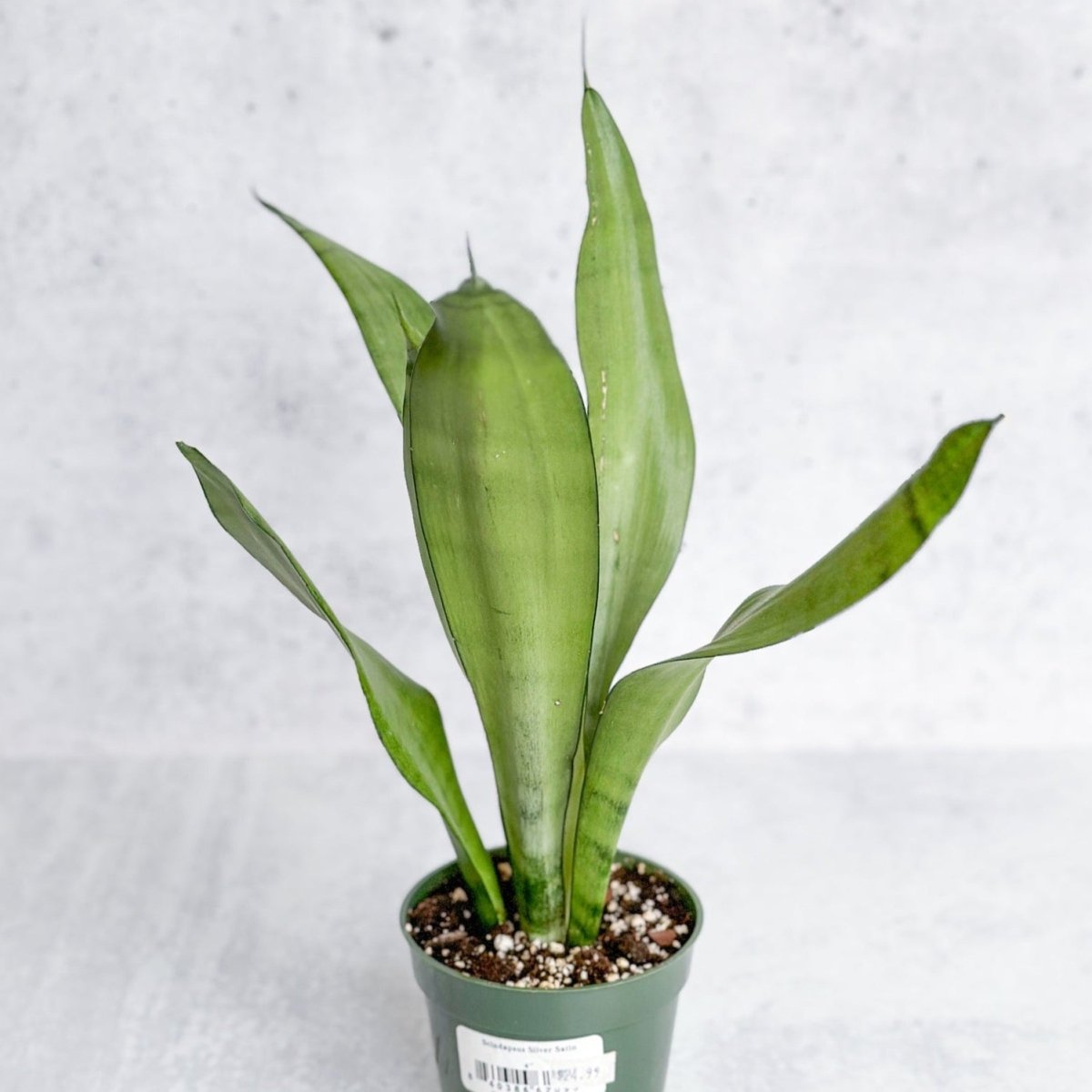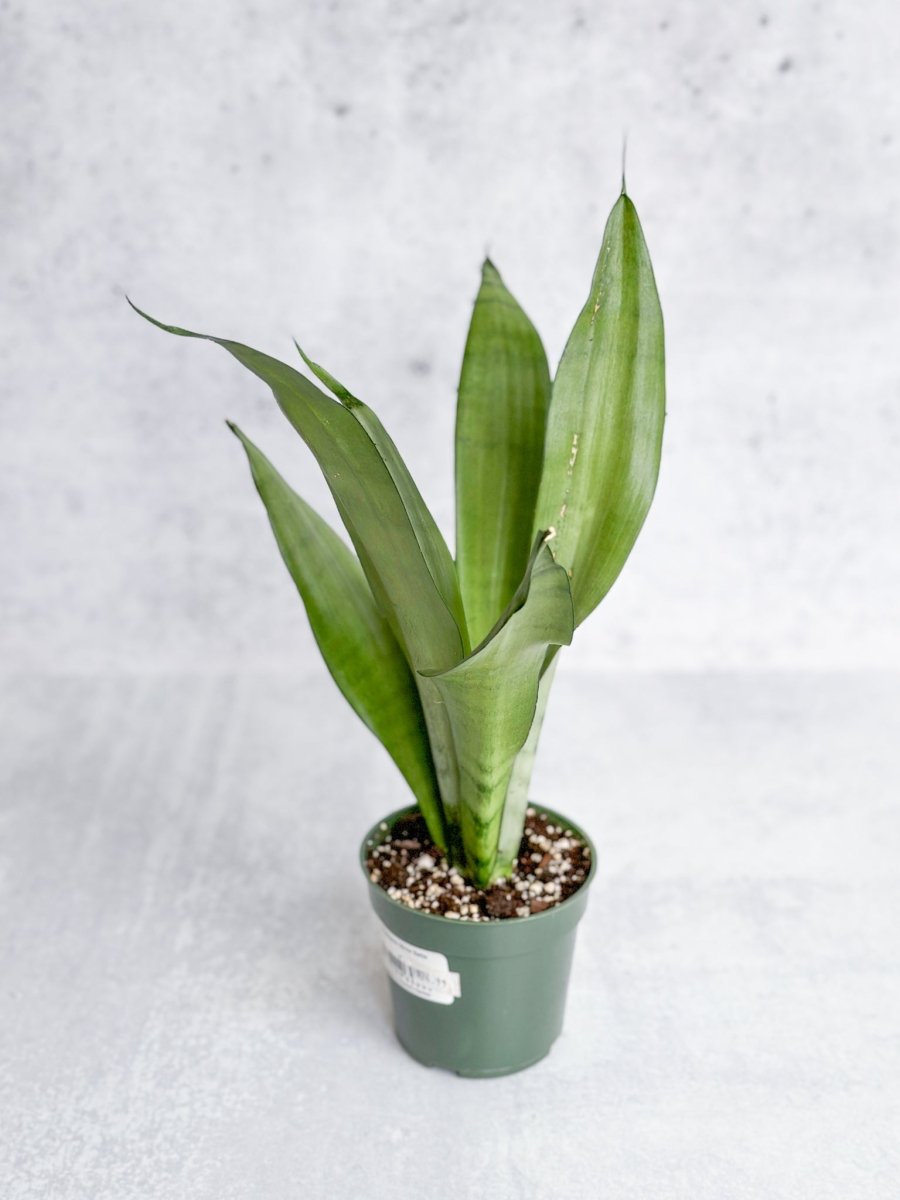Sansevieria trifasciata 'Moonshine'
Sansevieria trifasciata 'Moonshine' - 6" Nursery Pot is backordered and will ship as soon as it is back in stock.
Couldn't load pickup availability
Description
Description
Sansevieria 'Moonshine' – Elegant, Easy, and Effortlessly Modern
With its silvery-green, upright leaves and sculptural form, Sansevieria trifasciata 'Moonshine' brings a sophisticated, modern aesthetic to any space. Its clean lines and cool tones are ideal for minimalist and contemporary interiors, while its near-indestructible nature makes it perfect for beginners or low-maintenance plant lovers.
Also known as the Moonshine Snake Plant, this cultivar is not only a visual standout—it's a functional one too. Like other Sansevierias, it helps improve indoor air quality by filtering out common toxins, making it a smart and stylish addition to your home or office.
Plant Profile
Botanical Name: Sansevieria trifasciata 'Moonshine'
Common Names: Moonshine Snake Plant, Moonshine Sansevieria
Family: Asparagaceae
Native Range: West Africa
Growth Habit: Upright, slow-growing; can reach 1.5–2 feet indoors
Toxicity: Toxic to pets and humans if ingested (mild to moderate)
Care Guide
- Light: Best in bright, indirect light but adapts to low-light areas; leaves may darken in low light
- Water: Drought-tolerant—allow soil to dry out completely between waterings
- Humidity: Average indoor humidity is fine
- Temperature: 55–85°F; avoid cold drafts
- Feeding: Fertilize with a balanced houseplant fertilizer 1–2x per year in spring and summer
- Pruning: Remove damaged or dried-out leaves at the base
- Propagation: Division or leaf cuttings
- Pests: Rare; occasionally check for mealybugs or spider mites
Fun Fact: It Glows
Moonshine’s smooth, matte silver leaves almost seem to glow under low light or moonlight, giving it a serene, ethereal vibe that sets it apart from typical green foliage.
History & Lore
Native to Africa, Sansevierias were historically used for making strong fibers, and in some cultures, they were believed to ward off bad energy. The 'Moonshine' cultivar is a modern favorite due to its unique coloring and easy-going nature.
Want expert care tips?
Visit our Snake Plant Care Guide to help your Moonshine Sansevieria thrive all year round.
Keep Your Plants Cozy with Heat Packs
Live Plants – Frequently Asked Questions
Shipping
How are live plants shipped?
How are live plants shipped?
All live plants are carefully prepared and hand-packed to protect them during transit. Plants are shipped in their pots (not bare-root), with soil secured using polyfill to prevent shifting. Stems and foliage are supported with paper wrapping to reduce movement and minimize stress during shipping. We may adjust shipping timing based on weather conditions to protect plant health.
When will my plant ship?
When will my plant ship?
Most live plant orders ship within 5–15 business days. Shipping may be delayed during extreme heat or cold to protect plant health. Processing time is separate from transit time.
Do you ship live plants year-round?
Do you ship live plants year-round?
Yes, we ship year-round when conditions are safe. During extreme weather, we may temporarily hold shipments rather than risk damage in transit.
What should I expect when my plant arrives?
What should I expect when my plant arrives?
Minor shipping stress is normal. This may include slight leaf drop, drooping, or cosmetic blemishes. Most plants recover after a short adjustment period with proper care.
My plant lost leaves during shipping — is it dead?
My plant lost leaves during shipping — is it dead?
Not necessarily. Leaf loss can occur due to shipping stress or temperature changes, especially in winter. As long as the plant shows signs of life at the root or stem level, it is considered viable and may recover.
How can I protect my plant during cold weather shipping?
How can I protect my plant during cold weather shipping?
During colder months, we may recommend adding a Heat pack to help reduce transit stress. Heat packs help mitigate risk but do not eliminate the possibility of cosmetic cold stress.
Do you offer heat packs?
Do you offer heat packs?
Yes. Heat packs are available during colder months and are recommended when temperatures may affect plant health in transit. Please note that heat packs reduce risk but do not guarantee plant health, especially during extreme weather.
How long will it take to receive my order?
How long will it take to receive my order?
Most orders ship within 5–15 business days from the date of purchase.
We are a small, independently operated team, and all plants are inspected, prepared, and packed by hand. Unlike standard retail items, live plants require careful timing and handling to ensure safe delivery.
Processing times may be extended during:
- Holidays and peak seasons
- Extreme weather conditions
- Carrier delays outside of our control
Processing time is separate from transit time.
Will my plant look like the one on the website?
Will my plant look like the one on the website?
Good question — and we’re glad you asked. Because we work with living plants, our inventory is always changing, and plants are often grown and shipped in batches. This makes it impractical to photograph every individual plant.
The photos on each product page are representative of the average size and fullness of that plant at the time of listing. While natural variation is expected — some plants may be slightly larger or smaller — your plant will be similar in overall appearance and quality.
Each plant is hand-selected and packed with care to ensure it arrives healthy and ready to grow.
What should I do after unboxing my plant?
What should I do after unboxing my plant?
Unbox your plant promptly, place it in bright, indirect light, and allow a few days to adjust before repotting or making changes. See our Plant Unboxing Guide for detailed tips.
Do you offer express shipping?
Do you offer express shipping?
Express shipping may be available on select items at checkout. Please note that faster shipping does not always eliminate weather-related risks and processing for live plants. Need your order sooner? Send an email to support@edsplantshop.com
Where do you ship?
Where do you ship?
We ship our selection of rare, healthy, and unique houseplants all across the United States including California. At this time, due to customs and agricultural limitations, we are unable to ship plants internationally from the United States.
Returns and Refunds
What is your 15-Day plant health guarantee?
What is your 15-Day plant health guarantee?
Small plants (8” nursery pots and under) are covered by our 15-Day Plant Health Guarantee, starting from the delivery date.
Large plants (10” nursery pots and above) have a 48-hour inspection and reporting window from delivery.
Coverage applies to severe and irreversible decline through no fault of the customer. Full details are outlined in our Refund & Returns Policy.
What should I do if my plant arrives damaged?
What should I do if my plant arrives damaged?
Please email us at support@edsplantshop.com within the inspection window with clear photos of the plant and packaging. Do not discard the plant or materials until our team reviews your case.
What is your return policy for non-plant items?
What is your return policy for non-plant items?
Approved non-plant items may be returned within 30 days of delivery, subject to the following:
- Items must be unused and in original packaging
- Prior approval is required
- A 15% restocking fee applies
- Customers are responsible for return shipping
Final-sale items are not eligible for return or refund.
Can I cancel my live plant order?
Can I cancel my live plant order?
Live plant orders may be canceled only if they have not entered fulfillment. Once packing or shipping has begun, orders cannot be canceled.
Can I return or exchange a plant?
Can I return or exchange a plant?
At this time, we do not accept returns on plants. In extreme circumstances where a return of a plant is necessary, the customer is responsible for the return shipping and a refund will only be issued if the plant arrives back to us in living condition.
How long will it take to receive my refund?
How long will it take to receive my refund?
Refunds are processed within 3-7 days from when we receive the item(s).
Still have questions?
Still have questions?
👉 [View our full FAQ & Policies] or Email us at support@edsplantshop.com with your order number, photos, and any questions. We’re happy to help.











